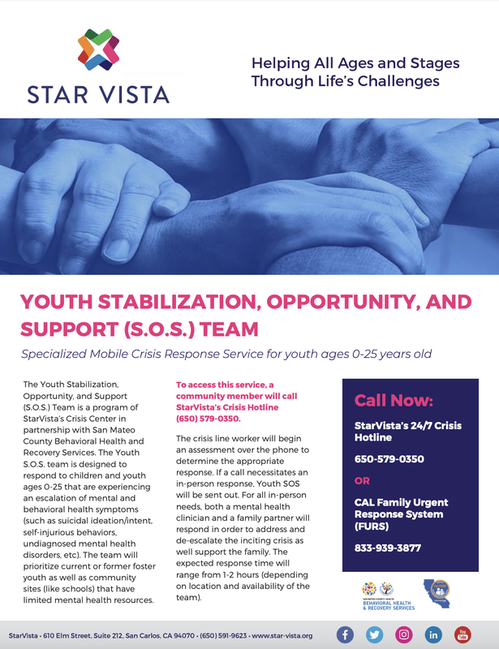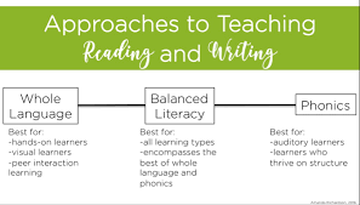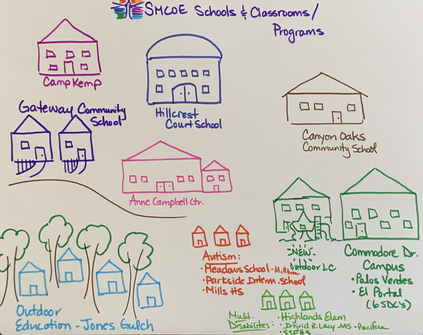|
Star Vista launched its Youth Stabilization, Opportunity, and Support (SOS) Team this month.
The Youth SOS Team provides over the phone or in-person response to youth ages 0-25 living in San Mateo County that are experiencing an escalation in mental health symptoms, ranging from suicidal ideation to undiagnosed mental health disorders. The team is comprised of mental health clinicians and family partners to comprehensively address any assessment, psychoeducation, therapeutic, or case management needs. Anyone may access this 24/7 service by calling the crisis hotline at 650-579-0350.
0 Comments
Today's New York Times article, "In the Fight Over How to Teach Reading, This Guru Makes a Major Retreat," describes how a legend in reading and "writing workshops" has reformulated her base curriculum to include a focus on the science of teaching reading, including letter decoding and phonics basics.
What's interesting about this article is that this is not the first time Ms. Calkin's theories have been questioned. In fact, when I used two of her text books while earning my degree in Elementary Education between 1990-1994, the "whole language" movement was in full swing. I did not go to Teacher's College, but I went to a well-established school for teaches in Upstate New York called Russell Sage College. Lucy Calkins was indeed considered the leader in this area at that time. In California, however, when the "new" school standards were implemented in 1997-1998, phonics became a focus and "whole language" teaching methods were questioned. Although, I am sure some of these methods persisted. They were again questioned in 2011 with the roll-out of the Common Core Standards, and phonics instruction was woven into the then-current reading programs and texts -- though, there was also parallel focus on "balanced reading," I assume because the education community (and the publishing houses) were tied to it, I have to imagine. As I visited classrooms in the the SMFCSD during 2013-2017, there were Calkins "writing workshop" lessons and mentoring being implemented, there was a focus on balanced reading... and there were phonics. Also, to be clear, when I taught in the mid-90's, my lessons (within the whole language scheme) included phonics. I am not sure it was, or could be, extracted from lessons. So, the questions are: Can phonics and balanced literacy co-exist? Can some children learn to read without direct phonics instruction? Perhaps. Is a delay in phonics instruction a best practice? Likely not. Children's love of literature, word decoding skills, and reading comprehension is a multi-faceted process -- and while this article certainly shows a change of course for Ms. Calkins, I do believe that phonics have never been omitted entirely, but their emphasis as the most-important component of reading as varied over the years. This article - and Lucy Calkins' position on the matter - may once and for all settle the fact that phonics should come first, but given the nature of education publishing houses - and the vast amounts of money to be made from "selling" teaching strategies, I am not entirely certain that this is the final word. May is Mental Health Awareness Month. As a member of the San Mateo County Commission on Disabilities, the San Mateo County Mental Health and Substance Abuse Recovery Commission (MHSARC), and the Board of NAMI San Mateo County, as well as a mom of a child with a psychiatric disability, I am always focused on raising awareness of mental health & mental illness resources and supports. There are a number of events in our community this month to raise awareness and to connect our community to a vast array of resources. If you would like more information about what to do in a mental health crisis, how to get connected with mental health or psychiatric services, or how to meet parents or peers with experience navigating the systems in San Mateo County -- including schools, BHRS, and medical facilities, please feel free to contact me or find more info at: San Mateo County Health, NAMI San Mateo County, Star Vista -- some of our key mental health organizations and resources in San Mateo County.
The County Board of Education provides leadership and citizen input for county educational programs and services operated by the San Mateo County Office of Education, including services provided to school districts and the community. (BP 9000) The mission of the San Mateo County Office of Education is to ensure and improve the quality of learning for all students in San Mateo County by providing exemplary leadership and innovative, effective programs and services which enable local districts and the county office to educate students to realize their potential. (BP 6110)
The San Mateo County Office of Education operates Court and Community Schools & Programs to support students throughout the County. If you are interested in learning more about or sharing your experiences with the schools and programs operated by the San Mateo County Office of Education, please feel free to contact me. You can also find out more here. |
Archives
August 2023
Categories |
|
Working Every Day to Create Opportunity, Inclusion & Accountability in San Mateo County Schools |
Copyright © 2021





 RSS Feed
RSS Feed
